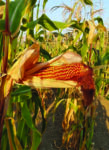The educational materials listed on this page are about Corn.
Field corn is a commodity crop that is grown for many different purposes, especially livestock feed, fuel and further processing for human consumption. Sometimes called maize cultivation, cultivating corn is predominant in the Midwestern region. Field corn cannot be readily eaten and must undergo some form of processing first. Sweet corn, on the other hand, is grown for human consumption and can be eaten fresh. Conventional corn, organic corn and no-till corn are all important players in the corn market. Understanding your inputs, acreage and fertility can aid in using a corn yield calculator to determine corn crop. Corn production will vary depending on region, but not necessarily corn production by state. Corn growing is an important part of our agricultural food system. Key practices in corn production include organic agriculture, commodities, agronomic, corn, no-till, conservation tillage, cover crops, crop rotation, nutrient management, drought tolerance, crop improvement and selection.
A key resource to discovering the balance between soil and crop is SARE’s book Building Soils for Better Crops. This resource lays the foundation for understanding soil structure, soil fertility and overall soil management in order to improve corn production. SARE’s Crop Rotation on Organic Farms: A Planning Manual is a resource for farmers looking to integrate crop rotation into their operation to practice more sustainable methods, and to enhance organic matter and boost production. The Cover Crop Topic Room is a good starting point to learn more about the benefits that cover crops can have on overall soil management to improve corn yield.
Showing 1-2 of 2 results

Researchers Work to Develop, Test Dry-Farm-Adapted Corn Varieties
As farmers and agricultural researchers work to adapt to changing climatic conditions, some are looking to future innovations, some are exploring past agricultural practices, and some are doing both. In Western Oregon, a collaborative effort to establish and expand dry farming – growing crops without irrigation – is decidedly in the “doing both” camp. “There […]
Sustainable Agriculture Farming Systems Project
Public concerns regarding pesticide misuse, food safety, water use and contamination, and depletion of non-renewable resources have motivated the reevaluation of some of the practices of conventional agriculture and the exploration of alternative, more sustainable approaches to growing food. In 1988, the Sustainable Agriculture Farming Systems (SAFS) project was established at the University of California’s […]